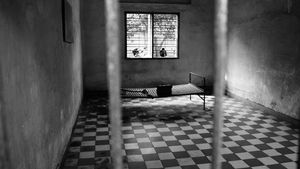JAKARTA - The Lower House of the French Parliament on Tuesday, June 29 local time, voted in favor of a law that would allow single women and lesbians to access medically assisted reproduction.
The final vote on the Bioethics Law, presented by the government of French President Emmanuel Macron, has been eagerly awaited by LGBT rights groups, who have pushed for reproductive measures since France legalized same-sex marriage in 2013.
In the vote, 326 members of the Lower House of the French Parliament voted in favor of this law, while 115 other members voted against it.
The new law will expand access to fertility treatments such as artificial insemination and in vitro fertilization (IVF), which are currently reserved for infertile heterosexual couples.
In France, fertility treatment is free and once the law is passed this will also cover lesbian couples and single women.
Health Minister Olivier Veran said French authorities were preparing to implement the new law as soon as possible so that the first child could be conceived by the end of the year.
The vote marks the end of a protracted two-year debate in parliament. The conservative majority in the Senate has repeatedly rejected the measure, but the lower house of parliament, in which President Macron's centrist party has the majority, has the final say.
The National Assembly has approved the bill three times and will definitively adopt it on Tuesday.
French LGBT rights groups lobbied for the measure after France legalized same-sex marriage under President Francois Hollande, after months of mass protests by conservatives and Catholics.
"Finally", said Matthieu Gatipon, spokesman for the Inter-LGBT association welcoming the 'long awaited progress' as quoted by Euronews Wednesday, June 30.
"We are satisfied that this is over. But it is a painful birth", he continued, expressing frustration at how long it took to get the final vote of the law.
Gatipon said it was difficult for French women who had to put off for years their plans to have a baby and others who had to pay expensive fees to go abroad, to countries where such a procedure was available, such as Spain and Belgium.
SEE ALSO:
To note, the new law does not address France's ban on surrogate arrangements, in which a woman carries and delivers a baby for someone else.
👩👩👧👦👩👧👦Fière de mon pays qui a (enfin) ouvert l’accès à l’AMP à toutes les femmes 🇫🇷!
Pensées à @CoDubost qui s’est énormément investie sur ce texte et qui a su le défendre avec beaucoup d’émotion et de conviction ❤️.
— Marie 🇫🇷🇪🇺💉 (@MBerthelot1807) June 29, 2021
The English, Chinese, Japanese, Arabic, and French versions are automatically generated by the AI. So there may still be inaccuracies in translating, please always see Indonesian as our main language. (system supported by DigitalSiber.id)


















